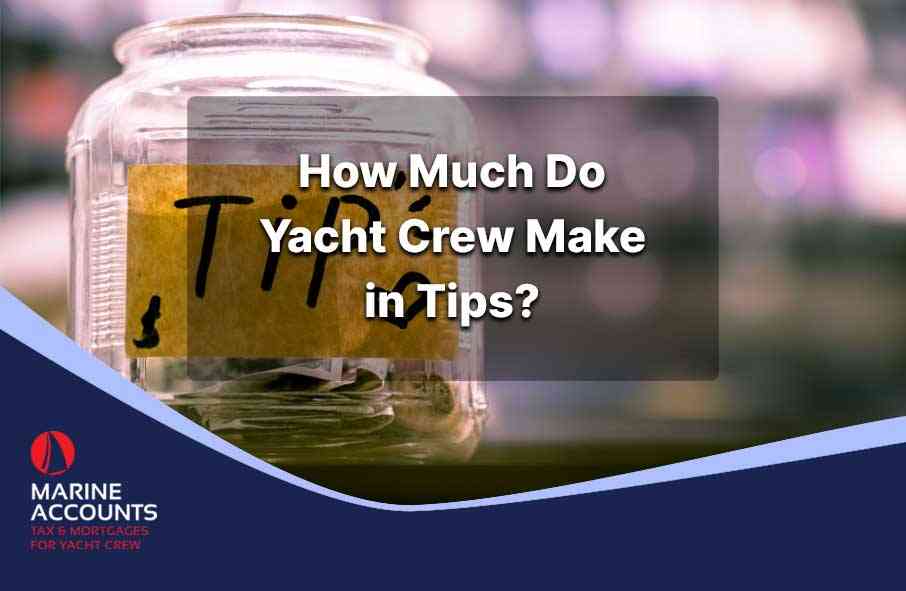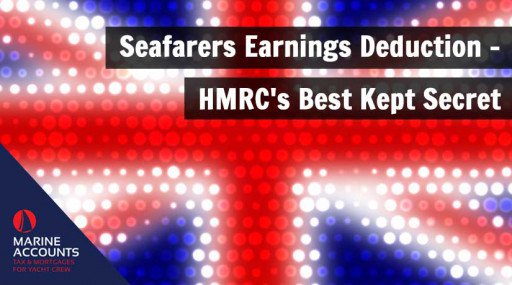How Much Do Yacht Crew Make in Tips?
- Authors
-
-

- Name
- Patrick Maflin
-

Receiving tips in any line of work is a very motivating and rewarding aspect of any job.
In the case of yacht crew, tips can greatly add to what is already a very generous basic salary.
But how much do yachties typically receive as tips from guests aboard superyachts?
We take a look in the chapters below.
Chapters
- What Crew Members Does a Yacht Typically Have?
- Do Yacht Crew Receive a Salary?
- Do Yacht Crew Receive Tips?
- How Much Do Yacht Crew Make?
- Is It Customary to Tip Yacht Crew?
- How Much Do Charter Yacht Crew Make in Tips?
- How Much Do Private Yacht Crew Make in Tips?
- Is Yacht Crew Income Taxable?
- Should I Declare My Income to HMRC?
- Conclusion
What Crew Members Does a Yacht Typically Have?
The type and number of crew members on a yacht depends greatly on its size.
A yacht will always have a captain, and almost always stewards and a deckhand.
On larger yachts there will generally be several deck hands, a number of interior crew members and engineers.
Do Yacht Crew Receive a Salary?
 Yacht Stewards Serving Food
Yacht Stewards Serving Food
Yes, yacht crew are paid a monthly salary.
However they can expect to receive tips in addition to their basic take home in certain circumstances.
The average yacht salary for a deckhand or a junior stewardess, for instance, generally ranges between £2000 to £2700 per month.
This will vary depending on the type and size of yacht, and whether it is a private yacht or a charter yacht.
One will also need to take into account any holiday packages that may be offered in addition.
Do Yacht Crew Receive Tips?
Charter clients often give tips to the crew members as an appreciation for their service and input in making their time on board a great experience.
When guests feel they have been well looked after, comfortable and entertained, they are much more inclined to tip the crew members.
So if you do a great job as a yacht steward, you’re far more likely to get tipped.
How Much Do Yacht Crew Make?
On average, if you work on a 1 week charter, you can expect to get tipped somewhere between 5% to 15% of the weekly charter price.
Charter managers typically advise that at least 10% of the entire charter cost is attributed to crew tips.
This is known to be the customary amount but it will vary slightly depending on the charter guests as well.
Guests will give this amount to the yacht captain at the end of the charter, and then it is the captain who takes care of dividing the sum up among the individual crew members.
At times, guests will get an even higher tip by charter clients.
This is one of the reasons why many crew members prefer to work on busy charter vessels rather than private ones.
Position | 20-40m Yacht | 40-60m Yacht | 60m+ Yacht | 80m+ Yacht |
| Captain | €4,000-€10,000 | €7,000-€16,000 | €14,000+ | €16,000+ |
| 1st Officer | €3,000-€5,000 | €4,300-€5,700 | €6,000+ | €7,000+ |
| Bosun | €3,200-€4,500 | €4,000 | €5,000 | |
| Chief Stewardess | €3,000-€4,500 | €4,000-€6,000 | €6,000+ | €7,000+ |
| Senior Stewardess | €2,800-€3,000 | €2,800-€3,500 | €3,500+ | €4,500+ |
| Senior Deckhand | €2,800-€3,500 | €2,800-€4,000 | €3,500+ | €4,500+ |
| Junior Stewardess | €2,000-€3,000 | €2,000-€3,000 | €3,000+ | €3,000+ |
| Junior Deckhand | €2,000-€3,000 | €2,000-€3,000 | €3,000+ | €3,000+ |
| Chef | €3,000-€4,500 | €4,000-€7,000 | €6,000+ | €7,500+ |
Is It Customary to Tip Yacht Crew?
Strictly speaking, the answer depends on whether the yacht is private or a charter.
In the case of the latter, yes it is customary to tip the crew.
Charter managers will usually advise that the customary amount to give as tips to the crew is 10% of the charter cost.
How Much Do Charter Yacht Crew Make in Tips?
 Yacht Stewards Can Make Considerable Earnings in Tips
Yacht Stewards Can Make Considerable Earnings in Tips
Tips are probably the most motivating aspect of working on a charter yacht.
The starting salary will be topped up considerably with tips.
For instance, let us consider a junior deckhand working on a 45m charter yacht, with a basic salary of £2000.
They could easily top up their salary by as much as £2500 per week over 10 weeks of charters, hence that is potentially an additional £25,000 per year!
If filed under the seafarers earnings deduction by a qualifying UK resident, that income is potentially 100% tax free.
However in such cases, the annual leave allowance per year will be considerably lower than a deckhand working on a private yacht for example, as generally there will be around 38 days leave per annum only.
This is around a third of what a deckhand working on a private yacht generally has.
How Much Do Private Yacht Crew Make in Tips?
For crew members working on private yachts, it’s fairly uncommon to receive gratuity from the owners on a regular basis.
However, in such cases the owners may opt to pay for a team dinner or even a trip at the end of the season as a way to thank crew members for their hard work.
Having said that, even though there will be no tips to benefit from, the overall conditions may still be very appealing.
To give a basic example to better explain the difference between a charter and a private yacht, let us consider a junior deckhand working on a 100m private yacht.
They may receive a basic salary of around £2400 per month, and also receive a yearly bonus of £4000, as well as a holiday package of 3 months on, 1 month off.
Hence, this means they get a total of 120 days annual leave per year.
Is Yacht Crew Income Taxable?
Many people who work on yachts have the misconception that they do not need to declare their income or have to pay income tax on it, since they do not reside in a particular country whilst working at sea.
However, nothing can be further from the truth!
What’s intriguing and exciting however is that if you’re a UK resident and work as a seafarer, you may be able to claim 100% of your income as tax free under the conditions of your employment.
Certain qualifying criteria will need to be met such as calculating the number of tax days spent at sea.
This tax loophole is referred to as the ‘SED’, which stands for HMRC’s Seafarers Earnings Deduction.
This grants seafarers the right to claim 100% tax exemption on foreign earnings.
This law came into effect in 2012 following a long period of disputes between the HMRC and trade unions.
In order to be eligible for the SED, one needs to satisfy the following:
Be employed aboard a ship
The word ‘ship’ is not defined very clearly in tax law, so this can sometimes be a little confusing.
However it’s safe to assume that one needs to be employed onboard a sea vessel which can navigate under its own power and is engaged in a voyage or part voyage that either begins or ends outside the UK.
Hence, any offshore installations such as fixed or floating production platforms and storage units, flotels and mobile offshore drilling units, do not qualify.
Visit at least one foreign port
During each employment in any given tax year, you must have visited at least one foreign port outside the UK.
Therefore, a voyage or part voyage that starts or ends outside the UK territorial limits, either to or from a foreign port, or to a rig that is drilling outside a designated area, or to complete a replenishment at sea operation.
Fulfils the qualifying period
You must establish a qualifying period by spending at least 183 days i.e 6 months and 1 day, outside of the UK within the 365 days following departure.
You would be considered as being absent from the UK on a specific day as long as you are outside the UK at midnight of that day.
Any non-work days that are spent outside the UK can be considered to be days of absence.
There is the half-day rule, which specifies that you need to have spent more than half of your time out of the UK since the beginning of the period that you started to work overseas.
Land based income will remain taxable, regardless of whether one is eligible for the SED.
However the current personal tax allowance of £12,570 (2023/2024) can be taken into account.
Should I Declare My Income to HMRC?
 Declaring Income to the Tax Authorities is a Must
Declaring Income to the Tax Authorities is a Must
Yes, without question!
The HMRC will still expect to receive a declaration of income from a seafarer, even though there may not be any tax to be paid with regard to that income.
It’s always best to declare it to ensure all your tax affairs are in order and that you may qualify for the SED.
Any attempts to avoid declaring income to avoid taxes could lead to serious repercussions if discovered.
Nowadays, banks share financial details across numerous channels including the tax authorities, so it is simply foolish to deposit large sums of income without declaring it accordingly.
Conclusion
It’s important to be aware of the above aspects relating to tips, income and taxes for seafarers, so as to know what is most applicable for your case as a seafarer.
We hope that this overview has given you a clearer idea of how much you could potentially earn whilst working at sea.
However if you have any questions about getting into yachting or how to prepare your taxes for filing to HMRC, we are more than happy to answer any queries you may have or offer you a tax consultation.
Disclaimer: Any advice in this publication is not intended or written by Marine Accounts to be used by a client or entity for the purpose of (i) avoiding penalties that may be imposed on any taxpayer or (ii) promoting, marketing or recommending to another party matters herein.






